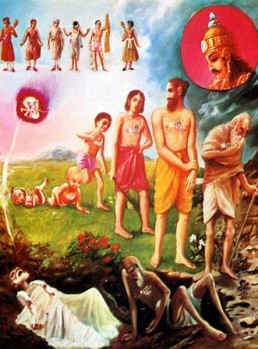Swami Chinmayananda Commentary
There are commentators who believe that this and the following stanza explain the Path of Renunciation, which is, in fact, not altogether ignored in the text of the Geeta. Since, as we said earlier, the second chapter is almost a summary of the entire Divine Song, it has to indicate even this Samnyasa Yoga, which will be later on explained at length and hinted at different places during the entire length of the Geeta.
This stanza seems to ring clearly the significant advice given earlier by Krishna, almost at the very opening of his philosophical discussions, in this chapter. He had advised therein: “HAVING CONQUERED THE MENTAL AGITATIONS CREATED BY THE PAIRS-OF-OPPOSITES, FIGHT THE BATTLE OF LIFE.” The same idea seems to be resounding here at the close of the chapter.
The first line of the stanza explains the mental condition of one who comes to discover Real Peace in himself. Such an individual, it says, renounces all desires and has no attachments or longings. The second line describes the condition of such an individual’s intellect and it asserts that it is without any sense of ‘I-ness’ or ‘my-ness.’ The ego is the cause for the sense-attachments and longings. Where the ego is not perceptible, as in sleep, there are no longings or desires in the individual or, at least, they are dormant. Thus, if the first line of the stanza is describing a negation of the effects of “ignorance,” the second line asserts the absence of the very cause from which desires and the agitations arise.
Earlier, in the introduction, we explained that the split in the personality of Arjuna was caused by the intervention of the sense of his ego and his egoistic-desires, which broke up the subjective and objective aspects of his mind into two independent islands with a vast ocean of surging waves of desires between them. With a soft suggestion, after explaining all the logic of thought, Krishna is carefully placing his finger on the very ulcer in the Pandava’s mind.
The stanza, in its sum-total suggestions, advises us that all our sufferings in the world are caused by our own ego-centric misconception and the consequent arrogance characterised by our ever-multiplying demands for wealth and our endless desires.
Samnyasa means sacrifice, and to live in a spirit of sacrifice after renouncing completely one’s ego and its desires is true Samnyasa, wherein an individual comes to live in constant awareness of his fuller and ampler Divinity. The general misunderstanding that to run away from life is Samnyasa, or to colour the cloth is to become a true monk, has cast an irreparable slur on the philosophy of the Upanishads. Hinduism considers him alone to be a Samnyasin “who has learnt the art of living his life in constant inspiration, which is gained through an intelligent renunciation of his ego-centric misconceptions.”
Shankara beautifully explains this point of view in his commentary on the stanza.
“THAT MAN OF RENUNCIATION, WHO, ENTIRELY ABANDONING ALL DESIRES, GOES THROUGH LIFE CONTENTED WITH THE BARE NECESSITIES OF LIFE, WHO REGARDS NOT AS HIS, EVEN THOSE THINGS WHICH ARE NEEDED FOR MERE BODILY EXISTENCE, WHO IS NOT VAIN OF HIS KNOWLEDGE, — SUCH A MAN-OF-STEADY-KNOWLEDGE, WHO KNOWS BRAHMAN, ATTAINS PEACE (NIRVANA), THE END OF ALL THE MISERY OF MUNDANE EXISTENCE (SAMSARA). IN SHORT, HE BECOMES BRAHMAN.”
THIS DEVOTION TO KNOWLEDGE IS EXTOLLED AS FOLLOWS:
Adi Sankara Commentary
Sah puman, that man who has become thus, the sannyasin, the man of steady wisdom, the knower of Brahman; adhi-gacchati, attains; santim, peace, called Nirvana, consisting in the cessation of all the sorrows of mundane existence, i.e. he becomes one with Brahman; yah, who; vihaya, after rejecting; sarvan, all; kaman, desires, without a trace, fully; carati, moves about, i.e. wanders about, making efforts only for maintaining the body; nihsprhah, free from hankering, becoming free from any longing even for the maintenance of the body; nirmamah, without the idea of (‘me’ and) ‘mine’, without the deeprooted idea of ‘mine’ even when accepting something needed merely for the upkeep of the body; and nir-ahankarah, devoid of pride, i.e. free from self esteem owing to learning etc. This steadfastness in Knowledge, which is such, is being praised:
The Bhagavad Gita with the commentary of Sri Sankaracharya – Translated by Alladi Mahadeva Sastry
Holy Geeta – Commentary by Swami Chinmayananda
The Bhagavad Gita by Eknath Easwaran – Best selling translation of the Bhagavad Gita
The Bhagavad Gita – Translation and Commentary by Swami Sivananda
Bhagavad Gita – Translation and Commentary by Bhaktivedanta Swami Prabupadha
Srimad Bhagavad Gita Chapter 2 – Verse 71 – 2.71 vihaya kaman – All Bhagavad Gita (Geeta) Verses in Sanskrit, English, Transliteration, Word Meaning, Translation, Audio, Shankara Bhashya, Adi Sankaracharya Commentary and Links to Videos by Swami Chinmayananda and others – 2-71

